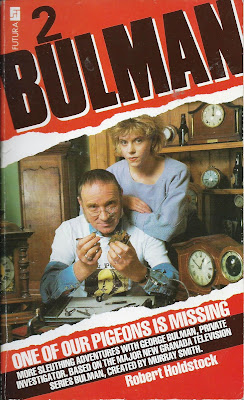'Bulman' (224 pp.) was published by Futura in 1984. It's a tie-in to the Granada television series, and is based on a character created by Kenneth Royce in his 1970 novel titled 'The XYY Man' (Bulman is the detective pursuing the burglar 'Spider' Scott).
Robert Holdstock also wrote the second tie-in novel for the series, titled, simply enough, 'Bulman 2'.
The Bulman TV series aired 20 episodes from June 1985 to August 1987. The tie-in novel presents, as best as I can tell, three of the first episodes of the series: Winds of Change, Pandora's Many Boxes, and Death of a Hitman. Several episodes of the series are available, somewhat grain-ily, at YouTube.George Bulman is an eccentric, and in the initial chapter of the book, we learn he has decided to retire from his position as Detective Chief Superintendent with the Metropolitan C.I.D. (i..e, Scotland Yard). Bulman hopes to earn a living fixing clocks on the premises of an antique shop in the London East End, but his plans are complicated when looking after the welfare of an old friend renews his familiarity with the criminal element. These adventures lead a reluctant Bulman to decide that he has greater earnings potential by working as a private eye: G. Bulman. Private Investigations undertaken. Anything legal. No divorce work. Excellent service guaranteed.
A prominent theme in the pages of 'Bulman' is the strained relationship between ex-cops who go private eye, and the staff of their former employer, the Met. Bulman, while quite capable of being a hard man if the situation calls for it, prefers to use cunning and some measure of guile in working his contacts from his days with the force. Too, Bulman isn't all that put out if his endeavors happen to make his former colleagues with the Met look less than competent.
There are sufficient pop culture references in 'Bulman' to evoke Eighties Nostalgia and the London of that era; for example, Bulman's Gal Friday, Lucy McGinty, listens to Boy George on her Walkman. I did find some of the British idioms and slang and commercial terms mystifying:
'It's only PG Tips, I'm afraid' (referring to some brand of tea ?)
"Why not ? Any ponce is better than no ponce."
"It's because the first Brits in your country were all from across Offa's Dyke. It's the way they speak" (a conversation with an Indian immigrant; I have no idea who Offa is)
"I mean, why should people flock to this Godforsaken part of London to get their clocks mended by an out-of-work rozzer ?"
"Cor, these soggy chips are smashin'."
'Bulman' is not, as I had hoped, a gritty, noir-ish exploration of British crime, being in fact very much a procedural. Save for the final chapters in the novel it avoids any focus on explicit violence, presumably reflecting its origin as a television show. That said, author Holdstock's prose style is engaging enough, and for those who are fond of novels focused on the utilitarian aspects of crime investigation, the novel will be an entertaining read.



Offa was an 8th century Mercian (the former western area of modern England) ruler, and his "Dyke" was an earthworks structure built to separate Mercia from what is now Wales. Wales has a separate original language from England, as do Scotland and Ireland.
ReplyDeleteSo it'd be referring to someone speaking English with a Welsh accent or inflection-- though people on the English side of that border can be pretty much unintelligible, too.
And yes, "PG Tips" is tea-- a brand of tea originally marketed to aid in digestion as "Pre-Gestion", and allegedly made from just the tender tip leaves of the tea plant.